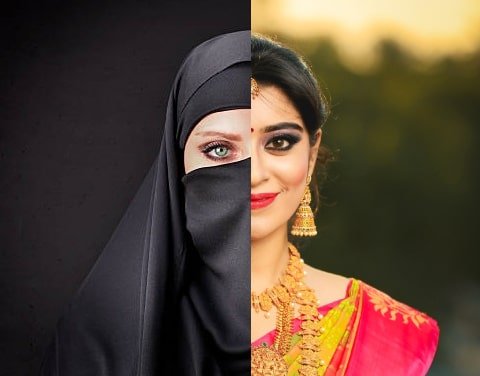The main idea behind creating Taboo Talks a public website is to let people feel free to share their experiences, ideas, views or content on topics they consider taboo.
What is Love Jihad?
Love Jihad, also called Romeo Jihad, is defined as an activity under which young Muslim boys and men reportedly target young girls belonging to non-Muslim communities for conversion to Islam by feigning love.
The concept first rose to national attention in India in 2009, with widespread conversions in Kerala and Mangalore. Still, claims have subsequently spread throughout India and beyond, into Pakistan and the United Kingdom.
Love Jihad cases all over India

In September 2009, posters appeared in Thiruvananthapuram, Kerala, under the name of right-wing group Shri Ram Sena warning against “Love Jihad” and announced that in December, the group would launch a nationwide “Save ourdaughters save India” campaign to combat “Love Jihad.”
In October 2009, the Karnataka government announced its intentions to counter “Love Jihad,” which appeared to be a serious issue” and ordered a probe into the situation by the CID to determine if an organized effort existed to convert these girls.
In November 2009, DGP of Kerala, Jacob Punnoose, stated no organization whose members lured girls by feigning love with the intention of converting.
With waves of publicity in 2009, 2010, 2011, and2014, the allegations of Love Jihad in India have raised concerns in various Hindu, Sikh, and Christian organizations, while Muslim organizations have denied the allegations.
The concept has remained a source of political contention and social concern and is widely regarded as a conspiracy theory by the Indian mainstream.
However, the Muslim organizations in Kerala called it a malicious misinformation campaign. They responded by claiming that Hindus and Christians have fabricated these claims to undermine the Muslim faith and community.
The controversial subject once again came into the Limelight when the Supreme Court, on August 16, 2017, ordered a National Investigation Agency (NIA) led the probe into a case in which the Kerala High Court annulled the marriage of a Hindu woman to a Muslim man.
Details of the Case and Love Jihad law
This story is about a 24-year-old Hindu girl called Hadiya, a resident of Kottayam, Kerala, who was a student of BHMS in Tamil Nadu. She had some difference of opinion with her parents and decided not to return to his native place.
Her father, Ashokan KM, had filed a habeas corpus in Kerala High Court after she left his house, as he felt that his daughter was being brainwashed through a “well-oiled systematic mechanism for conversion and Islamic radicalization.
Akhila alias Hadiya in her statement to the court said that she got attracted to Islam after observing her roommates and wanted to learn more about Islam. She further told the court that she was well within her rights to choose a religion of her choice.
She told the court again that she had taken up Islam of her own free will, and she wanted to continue to reside with Sainaba, a social worker, and did not want to go with her parents.
In January 2016, on the habeas corpus, the court found that she was not under any illegal confinement and allowed her to reside at the place of her own choice.
Ashokan told the court that she had been influenced and persuaded to convert to Islam. He held her friend and the friend’s father responsible for his daughter’s conversion to Islam, and he filed a writ petition in August 2016 stating that there was a move to take his daughter out of the country.
All this was happening at the backdrop of 21 Kerala youth missing and suspected to have joined ISIS. The court moved her to a private hostel and told the police to ensure that she didn’t travel out of the country.
Akhila alias Hadiya was supposed to appear before the court on December 21, 2016, when she informed that she had got married to a Muslim named Shafin Jahan. It was alleged that Islamic State’s mission in Syria recruited the woman and Jahan was only a stooge.
The Kerala High Court, on May 24, 2017, while declaring the marriage as “null and void,” had described the case as an instance of ‘Love Jihad’ and ordered the state police to conduct a probe into such cases. The court had observed that a woman could not be married off without the involvement of her parents.
Consequently, Ashokan, the father of Akhila(Hadiya), was granted custody of his daughter.
Meanwhile, Shafin Jahan moved the Supreme Court of India to take back the custody of his legally wedded wife after the Kerala High Court had annulled his marriage.
On August 16, 2017, the Supreme Court directed an NIA probe under the supervision of a retired apex court judge, RV Raveendran, into issues raised by Shafin Jahan, whose marriage had been annulled by the Kerala High Court that described the case as an instance of ‘Love Jihad.’
The court order came after the NIA, through additional solicitor general Maninder Singh, claimed that preliminary findings arrived at based on Kerala police investigations depicted that some extremist outfits were converting Hindu girls to use them later as recruits into organizations such as IS.
The counsel of Shafin Jahan vehemently opposed the NIA’s plea to peruse the investigation record of the case. A bench comprising Chief Justice J.S. Khehar and Justice D.Y. Chandrachud took serious note of this objection. It said that it gathered the impression that “the petitioner (Jahan) does not desire the correct and independent view of the controversy be brought before the court.
Further, the bench allowed Jahan to respond to the National Investigation Agency (NIA) plea seeking the court’s direction for Kerala Police to enable it to have access to the investigation records of the case.
The top court had said that it was entrusting the task to the National Investigation Agency (NIA) as a neutral agency to get a whole picture and ascertain whether the particular instance was limited to a “small pocket” or was there “something more comprehensive to the issue.
In 2020, The Uttar Pradesh ordinance titled “Uttar Pradesh Prohibition of Unlawful Conversion of Religion Ordinance, 2020,” promulgated on November 24, outlaws religious conversions marriage, coercion, deceit, or enticement. The law prescribes a jail term varying between one to five years, in addition to fines of up to Rs 15,000 for those convicted under it. The jail term goes up to 10 years and a penalty up to Rs 25,000 for conversions of women belonging to scheduled caste or scheduled tribe communities or minors, which the Supreme court of India turned down.
Is Love Jihad truth or hype?

The rhetoric of ‘Love Jihad’ as a flourishing concept has been in the news for nearly a decade now, but there have been no reported incidents of forceful conversions.
Inter-religion conversions have been in vogue since time immemorial in recent times; such modifications have happened more out of genuine attraction for the values of that particular religion.
An unconfirmed intelligence report submitted to the Kerala police chief revealed that at least two ‘recognized’ religious conversion centers in Tharbiyathul Islam Sabha, Kozhikode, and Monunsthil Islam Sabha, Malappuram converted as many as 5,793 people to Islam between 2011 and 2015. Conversions happening in other unrecognized centers in the state could be much higher.
The report stated that almost half of those who converted to Islam are women and that most of these women (76%) are below 35 years. Of those converted, 4,719 were Hindus, and the remaining 1,074 primarily Christian.
Identifying the Catalyst for Conversions
About a fifth of India’s 1.27 billion people identifies themselves as belonging to faiths other than Hinduism.
The annals of history hold testimony that the religious conversions were either done by the strength of the subjugated or the oppressed volunteered to convert and join the benevolent.
In a civilized society, it may be unthinkable to convert someone by force. Hence, the only means to attract someone from another religion is by demonstrating the virtues of that religion.
The religion of a man who has gone without food for days is; “Do Roti”……..the religion of a man who is homeless and is shivering in the cold; is the warmth of a shelter……most importantly, the religion of a man who has been denied dignity and pride; is providing self-respect and acceptance.
Hence, the most plausible reason for someone to convert to another religion is that he/ she is inspired by the values of that religion, which makes that person feel more secure.
However, in recent times the polarized environment through the length and breadth of the country is serving as a potent catalyst for greater communal conversions divide leading up to religious conversions.
Remember, the Muzzafarpur riots were triggered by the reported harassment of a Jatt Hindu girl by a Muslim boy ever since there have been numerous instances of hate crimes in different parts of India.
The ‘GauRakshaks,’ the goons of right-wing organizations of both religions backed by popularity-hungry politicians, using the indiscretion of our directionless youth as cannon fodder, are leaving no stone unturned to reduce to a bleak quagmire of hatred.
Though no cases of forced conversion have come to light, the rhetoric of ‘Love Jihad’ is just another means to stuff hatred into the conscience and impressionable minds of the youth.
Conclusion
To my mind, rather than feeling insecure about it, it should stroke the self-esteem of the guardian of that religion to introspect and weed out the improprieties and make their religion more acceptable and attractive.
Also, most of the inter-religion marriages occur due to a ‘fatal attraction between the couple. It is given the name of ‘Love Jihad’ to cover up the helplessness of the parents.
The History of Jihad: From Muhammad to ISIS
Islam is a fundamentally peaceful religion and that Islamic jihad terrorism is something relatively new, a product of the economic and political ferment of the twentieth century.


